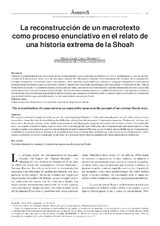La reconstrucción de un macrotexto como proceso enunciativo en el relato de una historia extrema de la Shoah
Autor
Calvo Montoro, María Josefa
Editor
Asociación de Estudios de Ciencias Sociales y HumanidadesFecha
2014Materia
Relato testimonialFormulación de la memoria
Macrotexto
Deportación
Shoah
Testimonial narrative
Memory formulation
Macrotext
Deportation
METS:
Mostrar el registro METSPREMIS:
Mostrar el registro PREMISMetadatos
Mostrar el registro completo del ítemResumen
Analizar la complejidad textual en el relato de los acontecimientos que se iniciaron en Nápoles en 1940 y acompañaron el caso d
e un niño víctima de la persecución racial, sirve de base para constatar las dificultades existentes en el tratamiento del recuerdo de la deportación. Escritura testimonial, revelaciones orales, documentos, obras literarias, representaciones artísticas e imágenes fotográficas conforman la enunciación de una memoria que, en este caso concreto, a menudo fue silenciada durante largos años por quienes vivieron los hechos. Para la formulación del relato y su posterior análisis, es necesario por tanto, un ejercicio de reconstrucción, un entrecruzamiento de textos que resulta problemático por su naturaleza plural e inclasificable. Las aportaciones contemporáneas en el análisis textual relativo a la deportación, han ido incorporando en su metodología una multiplicidad de enfoques que conducen a reflexionar sobre los huecos todavía existentes en el estudio de una realidad histórica que, paradójicamente, ha sido representada con gran profusión. The analysis of textual complexity in the account of events beginning in Naples in 1940 and surrounding the case of a child victim of racial persecution, forms the basis for establishing the difficulties arising from the treatment of deportation memories. Testimonial writings, oral disclosures, documents, literary works, artistic representations and photographs shape the articulation of a memory which, in this particular case, was usually silenced for many years by those who lived through the facts. Therefore, the formulation and subsequent analysis of the narrative require a reconstruction exercise, a textual intertwining becoming troublesome, given its plural, unclassifiable nature. Contemporary contributions in textual analyses dealing with deportation have been enriching their methodology with a great variety of approaches, which lead to a reflection on the still extant gaps in the study of a historical reality that has paradoxically been represented in abundance

